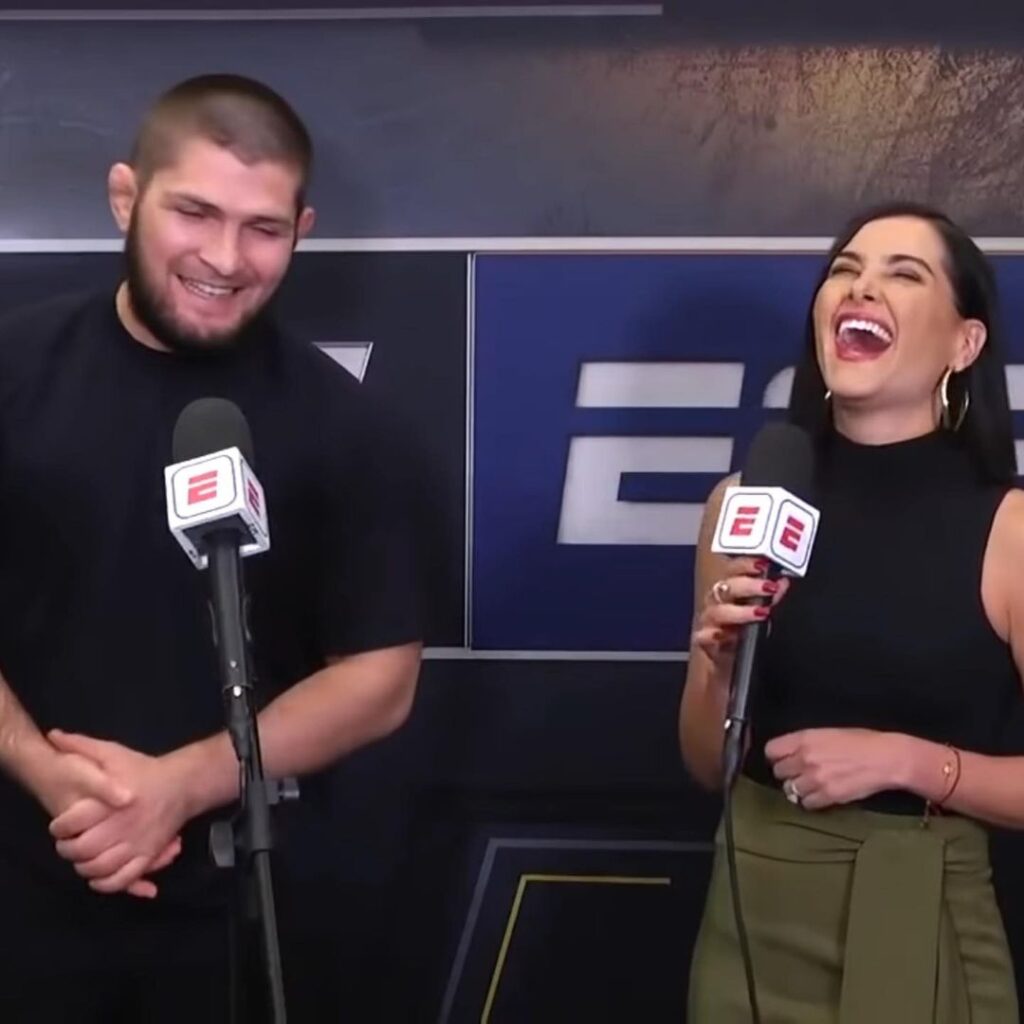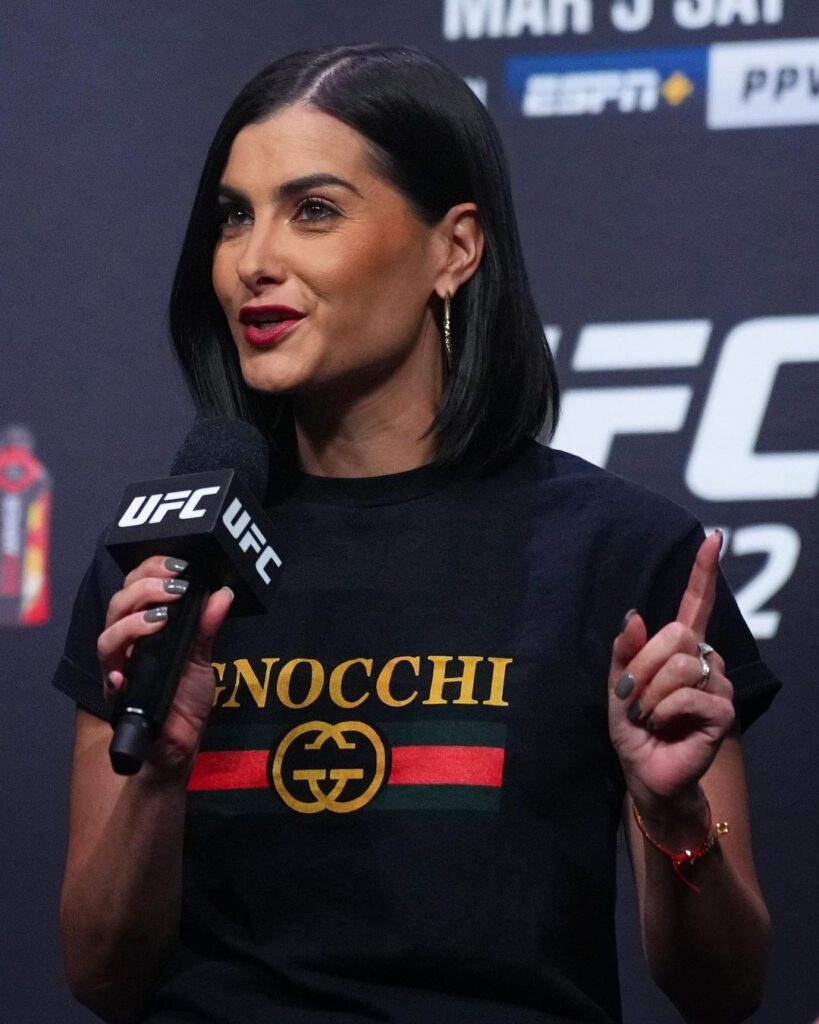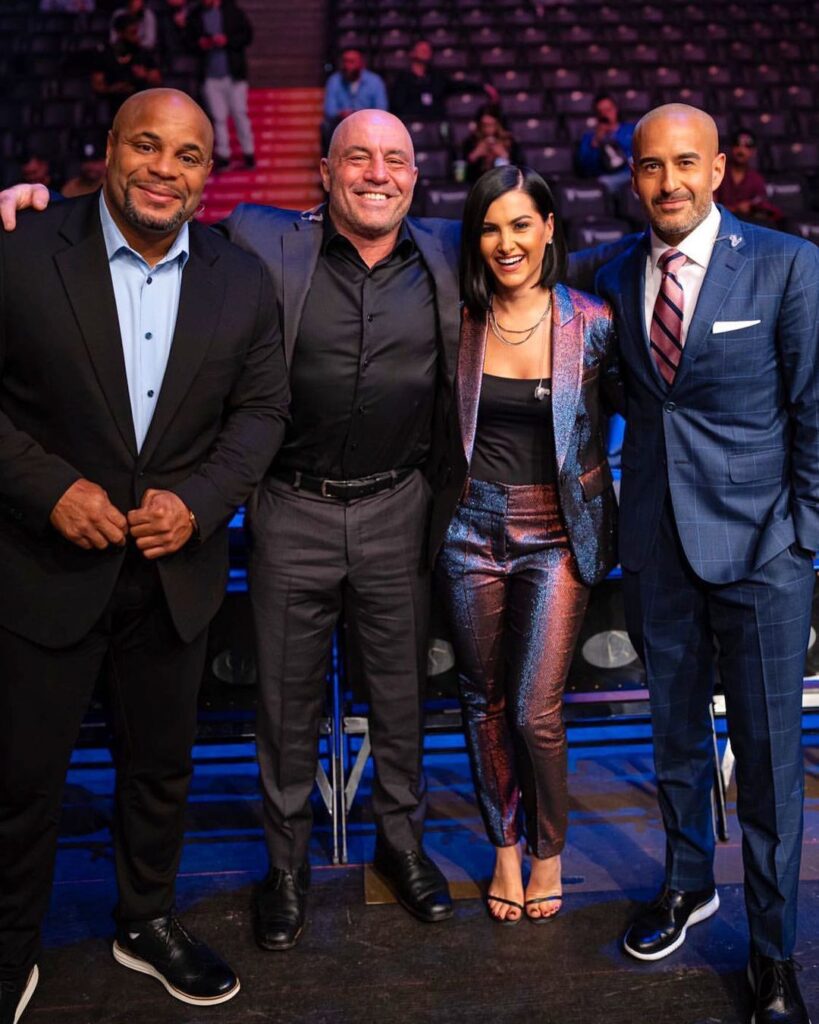Behind The Scenes Of UFC With Megan Olivi - What She's Learned From Working With Dana White, Conor McGregor & Ronda Rousey
Behind The Scenes Of UFC With Megan Olivi - What She's Learned From Working With Dana White, Conor McGregor & Ronda Rousey
Megan Olivi (@meganolivi) is a reporter and host for UFC and also a sideline reporter for the NFL on FOX. She sits down with Chris Van Vliet at the Blue Wire Studios at Wynn Las Vegas to talk about how she got started as a broadcaster, majoring in Political Science in college, landing her job with UFC, how interviewing Conor McGregor, Ronda Rousey and Brock Lesnar changed the course of her career, meeting her husband Joe Benavidez, working as a sideline reporter for the NFL on FOX, the best advice that Dana White has given her, being on the commentary team with Joe Rogan, her favorite UFC fight of all time and more!
Quote to think about: "Never let the fear of striking out keep you from playing the game.” - Babe Ruth
I don’t think people realize the full scope of the things that you do. They see you on UFC for like 20 seconds and think that it’s an easy job.
“Yeah, that is exactly the reaction from a lot of people. They think that I am either reading a teleprompter, reading a script that someone else wrote or that someone is in my ear. I write 100% of my own scripts and I memorize them all! There are no teleprompters in our world, it’s a lot. It’s live TV so we do a lot of pivoting, nothing ever goes exactly to plan. Sometimes you will prepare for 2 dozen things and only get to do 10 of them. Sometimes they will say ‘Hey all that work you did, you’ve got to throw it out.’ And you have to think of something new in 5 minutes. It’s about being ready for anything and being prepared and on your toes. You may have to fill for 24 minutes if all the fights end early, you have to be a part of that. But also there might not be time to get all the stuff in that you worked really hard on. So it’s a broad scope and a lot that goes into it.”
I don’t think a lot of people realize what goes into it all. So what does a “typical” pay-per-view day look like to you?
“So I will base that answer off of what happened last weekend. I do rehearsals of the intricate hits that you see, they have to be timed perfectly with the cameras and the fighters walk. We rehearse those so that the fighter looks so perfect when they are in position. I arrive at 10:30 am, get hair and makeup, go into rehearsal. If I feel like it needs it, I will edit the scripts and start memorizing as much as I can. The rest of the team then comes in, we try and get some food and then we just hit the ground running. The fights start at 3, which is pretty typical for west coast pay-per-views. We don’t stop, I left the building at midnight, it’s a long day. I will contribute to commentary, do reports and interviews. I also host a post-show for ESPN after the fights, so it’s a lot of different roles and variables. It’s a long day, when I get home I try to just eat 17 tacos and go to bed.”
How many different ways have you found to ask “How are you feeling?” Because that is what we want to know as the audience.
“That’s a good question, you definitely try to phrase things differently. But it has a lot to do with each person’s individuality. Some people you can’t just dive right in, you have to ask them something to make them comfortable. But some will just want to get in and out, so you will have to cut your words down and get the bare minimum so you can get the right wording and they can get out as well. There are so many things involved, but it is about how they are doing and what the future holds. You don’t see this in other sports, there is always another opportunity. But after a fight it is uncertain, so if I can get them to truly express themselves, I know that I am doing my job.”
You only have a handful of questions, like 2 or 3?
“Yes and that is what hard. On TV you have like 2 and a half minutes, which is not very long. If you are doing something for digital, or another platform where you can have 5 minutes, it’s amazing. But if you are on TV and an answer goes super long and you are getting wrapped, it’s killing me that I can’t ask this final question. Sometimes I will try and sneak it in, but it’s an art. People don’t realize that there are these time windows and figuring out where I can go from here, there is a lot in play.”

You have interviewed Ronda Rousey and Conor McGregor, how much have they changed the course of your career?
“Oh my God, I can confidently say that I would not be in the position I am in if it wasn’t for Conor and Ronda. They didn’t judge me on my age or my gender, they just judged me on how that conversation was for them. The first conversations went so well that they wanted to do it again, that is the highest honor. To be there for their career journeys, it means a lot. Those interviews go viral, and to be that platform where they can be their best selves, that means the world to me.”
Taking this way back, you went to school for political science. What did you originally think you were going to do for a career?
“I don’t know really, I thought I might manage political campaigns. I also thought about going to law school after that too, I just really enjoyed learning about the political landscape of our country. Not just modern times but how it was formed. I quickly realized that sports broadcasting was a real possibility. It wasn’t that I thought I couldn’t do, I just didn;t realize that it was an option. I was a die hard Yankees and Giants fan, my house was very sports dominated, but I never thought to consider it. Once I did start to realize it, then it became a possibility.”

But there are not thousands of jobs available for this.
“Right, which is why I wanted to get a degree. It was like well this helps me stand out from the pack. But I started out from the bottom by getting coffee and printing out scripts. I started out on the morning shows, so I would get the 4:12am train to New York City. I would get home and then go to classes in the evening. It was how can I set myself apart? Education is huge, but so is hands on experience and not thinking I am better than anybody. Part of the journey is learning every step along the way. Sometimes they are the thankless jobs, but we need all of them.”
People say you need real world experience, but that is not easy. How did you get your foot in the door?
“So I applied to all these different news networks and congressmen's offices. The only people that responded to me, I started in the summer before my sophomore year, said that they only take seniors. That is not always doable. People who responded said I was very gung ho so come on in. It was about non-stop movement, and it is not easy to get these opportunities. There are a lot of different avenues, but just keep trying, learning what you like and what you don’t.”
When did you start to block out the criticisms? With the industry that you are in, there is a lot of tweets, and not all of them are nice.
“I’m fortunate that most of them are kind. But when there is one that isn’t great, that is what sticks with you. I would be lying if I said it doesn’t affect me. If it’s about how I look, that is easier to ignore. I am fortunate that I don’t get a lot about my intelligence, because those are the ones that sting. I try to block it out but I am only human, I can tell you that nobody will be a harsher critic of me than myself. But it keeps me going and I strive for perfection, you can’t get that on live TV though.”
How did you find out about the UFC opportunity?
“So I worked in New York City, I was in grad school and interning. My boss was connected in the UFC world, so I started meeting people at dinners. It happened that a group of people had a videogame party and they said that there was going to be a post-show for the UFC and they were looking for a co-host, and they asked if I could do it. I said yeah, I was not ready for it, but I worked super hard and was part of the pre and post-shows.”
Did you ever think that you would be married to a fighter?
“Oh God no! I grew up in a house of combat sports athletes, but I never dated a fighter. But when I dated my husband, it was different.”
What changed?
“He is not your typical fighter. Everyone who has gotten to work with him adores him. You would never know in a million years that he was a fighter. But he was so good to be around, was never mean and he was just the best.”

What is it like working for Dana White?
“It’s interesting, but he finds a way. Look at what happened with COVID, people made fun of fight island, but then we did it and it was amazing. He made it work and made it an option where it wasn’t before. He finds a way and that is why the UFC is the way that it is. It is great to have that as a leader and it’s like well watch this!”
What is the best advice you have gotten from Dana by talking to him or just watching him?
“I think it is by watching him that fear doesn’t hold him back. He bets on himself and the people around him, and it shows that he has the best people. We don’t have many employees and they are all very young. I think as a broadcaster it gives me the confidence knowing that I am talented due to the confidence that he has.”
How did the NFL come about?
“FOX has been amazing. The original UFC partnership was with FOX, and 4 or 5 years into it I was a reporter for them on big fights. I got the call to do 2 NFL games as a try-out and go from there. I needed the UFC’s permission and Dana couldn’t have been prouder. The first game was the New York Giants, who I grew up watching. I did a post game with Ely Manning, and I used to wear an Ely Manning jersey all around college. I had a game the next week, they gave me more games and it just went from there. It wasn't that I was good at UFC, it was that I was a good broadcaster, and that meant a lot to me.”
So where does it go from here?
“So I am super fortunate and want to keep doing what I am doing. I want to be the best storyteller in sports, whether that is producing shows, I would still love to do a morning show too and fill up the weekdays a little more.”
I end every interview talking about gratitude. What are 3 things that you are grateful for right now?
“My health, my family and opportunitues.”
Embedded images: Instagram






